The AMD Ryzen Threadripper 3960X and 3970X Review: 24 and 32 Cores on 7nm
by Dr. Ian Cutress, Andrei Frumusanu & Gavin Bonshor on November 25, 2019 9:05 AM ESTCPU Performance: Encoding Tests
With the rise of streaming, vlogs, and video content as a whole, encoding and transcoding tests are becoming ever more important. Not only are more home users and gamers needing to convert video files into something more manageable, for streaming or archival purposes, but the servers that manage the output also manage around data and log files with compression and decompression. Our encoding tasks are focused around these important scenarios, with input from the community for the best implementation of real-world testing.
All of our benchmark results can also be found in our benchmark engine, Bench.
Handbrake 1.1.0: Streaming and Archival Video Transcoding
A popular open source tool, Handbrake is the anything-to-anything video conversion software that a number of people use as a reference point. The danger is always on version numbers and optimization, for example the latest versions of the software can take advantage of AVX-512 and OpenCL to accelerate certain types of transcoding and algorithms. The version we use here is a pure CPU play, with common transcoding variations.
We have split Handbrake up into several tests, using a Logitech C920 1080p60 native webcam recording (essentially a streamer recording), and convert them into two types of streaming formats and one for archival. The output settings used are:
- 720p60 at 6000 kbps constant bit rate, fast setting, high profile
- 1080p60 at 3500 kbps constant bit rate, faster setting, main profile
- 1080p60 HEVC at 3500 kbps variable bit rate, fast setting, main profile
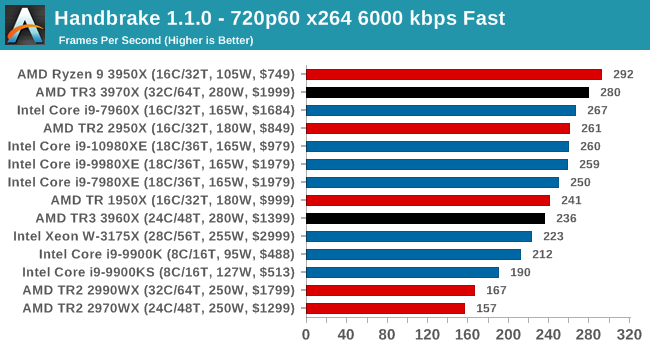
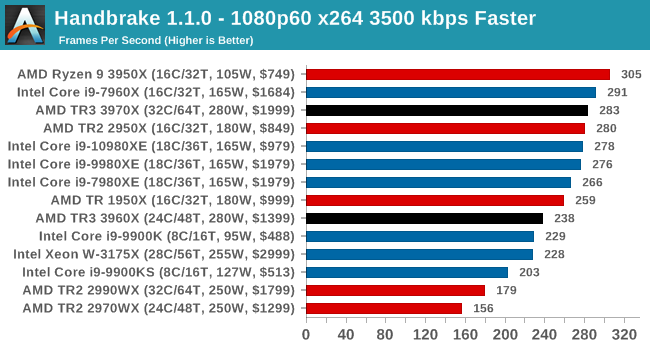
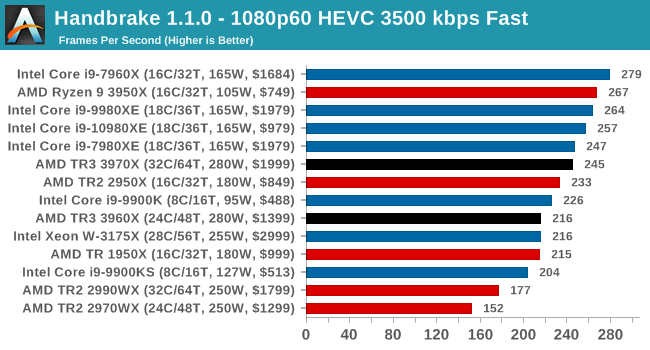
Video encoding is a little varied, based on the variable threaded nature. Certain encoding tests can be more memory sensitive here, or accelerated in different ways, or not scale well with more cores. Either way, TR3 performs a lot better than TR2, but the 3950X seems the best choice.
7-zip v1805: Popular Open-Source Encoding Engine
Out of our compression/decompression tool tests, 7-zip is the most requested and comes with a built-in benchmark. For our test suite, we’ve pulled the latest version of the software and we run the benchmark from the command line, reporting the compression, decompression, and a combined score.
It is noted in this benchmark that the latest multi-die processors have very bi-modal performance between compression and decompression, performing well in one and badly in the other. There are also discussions around how the Windows Scheduler is implementing every thread. As we get more results, it will be interesting to see how this plays out.
Please note, if you plan to share out the Compression graph, please include the Decompression one. Otherwise you’re only presenting half a picture.
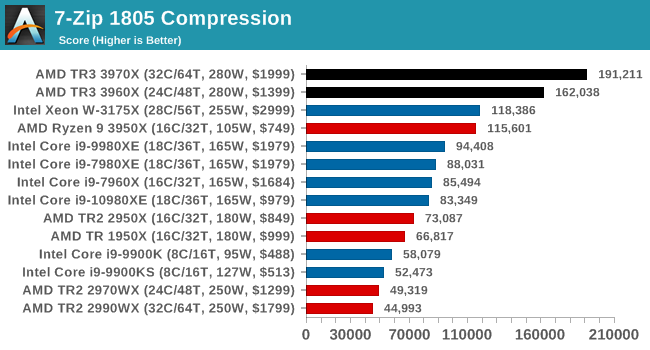
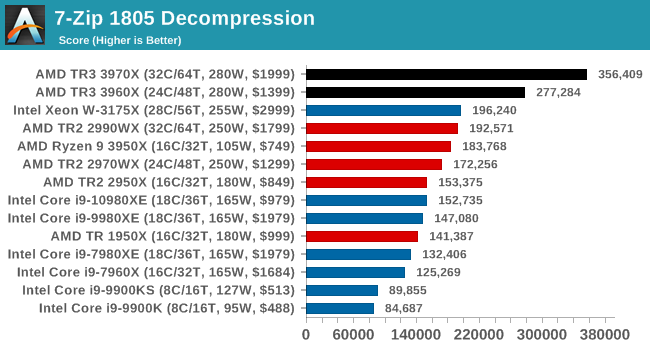
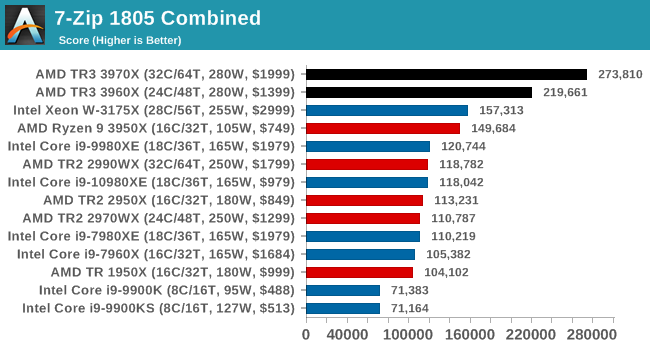
Easily parallel puts the TR3 well ahead of TR2 and Intel.
WinRAR 5.60b3: Archiving Tool
My compression tool of choice is often WinRAR, having been one of the first tools a number of my generation used over two decades ago. The interface has not changed much, although the integration with Windows right click commands is always a plus. It has no in-built test, so we run a compression over a set directory containing over thirty 60-second video files and 2000 small web-based files at a normal compression rate.
WinRAR is variable threaded but also susceptible to caching, so in our test we run it 10 times and take the average of the last five, leaving the test purely for raw CPU compute performance.
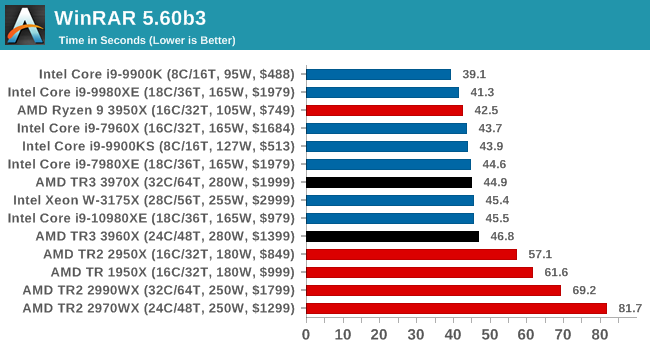
WinRAR is a variably threaded application, and both TR3 processors perform in the same ballpark as anything from Intel. Ideally we should have seen them streak ahead, but we seem to be at a point where CPU frequency or core counts are the limiting factor. At least with Zen 2, there are no issues as there was with Zen 1/Zen+.
AES Encryption: File Security
A number of platforms, particularly mobile devices, are now offering encryption by default with file systems in order to protect the contents. Windows based devices have these options as well, often applied by BitLocker or third-party software. In our AES encryption test, we used the discontinued TrueCrypt for its built-in benchmark, which tests several encryption algorithms directly in memory.
The data we take for this test is the combined AES encrypt/decrypt performance, measured in gigabytes per second. The software does use AES commands for processors that offer hardware selection, however not AVX-512.
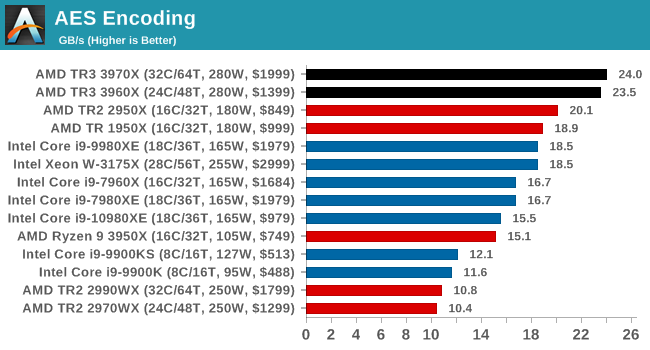










245 Comments
View All Comments
lobz - Monday, November 25, 2019 - link
As well as the quality. Yes, dramatically.dscott1414 - Monday, November 25, 2019 - link
Totally awesome article. Could you correct the very last sentence?icoreaudience - Monday, November 25, 2019 - link
When will Anandtech display a modern compression algorithm within encoding tests ?Zstandard comes with a built-in benchmark compatible with multithreading, an ideal case to test threadripper !
Flying Aardvark - Monday, November 25, 2019 - link
Fully patched Intel microcode and Windows?yeeeeman - Monday, November 25, 2019 - link
Probably yes since 10980xe performance is lower than 9980xeblppt - Monday, November 25, 2019 - link
I'm hesitant to take any of these mega-core intel benchmarks as accurate, though--- the 7980/9980 Geekbench 4 scores are laughably low (9980 should be north of 50K, not 30K, at the very least), so there's definitely something wrong with AT's setup for these cpus.Maybe the other benches are correct, but GB4 at least is messed up.
fackamato - Monday, November 25, 2019 - link
Nope, mentioned in the article - BIOS update not available.So fully patched, the Intel results would be somewhat lower.
BrainWaveCC - Monday, November 25, 2019 - link
I see a couple of "Threadripper 3950X" references where I expected to see "Threadripper 3960X" instead. For instance:"The interesting question here of course is, how is this UMA domain setup for the Threadripper 3950X and 3970X?"
dcmsnd - Monday, November 25, 2019 - link
May i ask you guys how did you got 44s with 2990wx in Corona benchmark ? Im getting 41s with stock clocks (2933cl14 memory, Win1909, latest AMD drivers, latest bios)41 vs 44 is quite big difference in percentage for such small time frame.
41s vs 34s AND 44s vs 34s is also a lot of difference.
Dug - Monday, November 25, 2019 - link
I would like to know this too.